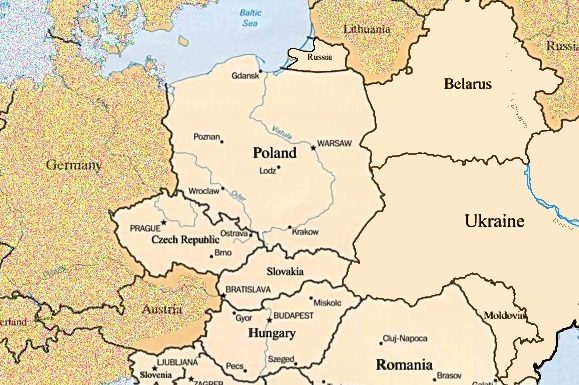By Alexandre Massaux, editor at French website Contrepoints.org
Today, Polish President Andrzej Duda welcomed his French counterpart Emmanuel Macron at the Élysée Palace. The meeting takes place against the backdrop of a European political and legal crisis which revolves around the question of the primacy of EU law.
The talks will focus on bilateral trade relations in areas such as energy, as well as security policy and “the cooperation of both countries within the European Union and the protection of the EU’s borders”. Nevertheless, also the question of the future of the EU and its model will surely be addressed.
Both Paris and Warsaw have a vested interest in strengthening the ties between the two countries. We share common interests.
➡ #Polish President Andrzej Duda is on Wednesday scheduled to visit Paris for talks with his #French counterpart Emmanuel Macron.https://t.co/GUnw2sppLk
— Radio Poland (@thenews_PL) October 27, 2021
Macron and Duda: an integrated Europe versus a Europe of nations
Both Presidents currently embody two opposing visions for the EU.
Emmanuel Macron is one of the most (if not the most) enthusiastic leaders when it comes to the EU construct. He is a proponent of a “European renaissance” and of strengthening European institutions and wants to develop joint projects and reforms at European level. His stated aim is European sovereignty, in the context of a French vision of a powerful Europe.
Andrzej Duda and the Polish Law and Justice party on the other hand embody a European vision based more on the Member States. The recent decision of the Polish Constitutional Court to grant national law primacy over European law is conform this line of thinking.
Tor the Polish government, the EU is more an instrument to provide aid and support for the country to develop than an embryonic nation. Moreover, the Poles prefer the American military umbrella over European sovereignty. The Polish seduction operation of “Fort Trump” is evidence of this.
It should also be noted that the political parties of both Presidents are major parties at the EU level. LREM and Law and Justice dispose, because of the number of seats they occupy in the European Parliament, of a dominant position within the EP’s groups.
This is the case for LREM withing the centrist Renew Europe group (of which a Macron adviser, Stéphane Séjourné, has just taken over the presidency), and for Law and Justice with the ECR (European Conservatives and Reformists). Brexit has benefit both parties to gain influence in European affairs.
Common traits and areas of cooperation
Despite these differences, the two leaders are both committed to the EU (the Poles do not want to leave) and both of them see policy areas where the EU can be useful.
In terms of energy, both Poland and France want nuclear power to be used in the energy transition. Both countries signed a joint declaration in March 2021 urging the EU to support this sector.
The coming battle in the EU over nuclear energy: "Macron, backed by a number of eastern leaders but also some southern countries such as Greece and Italy, has argued nuclear energy is necessary to cut emissions and boost electricity production." https://t.co/c6M6Bf0Clr
— Ulrich Speck (@ulrichspeck) October 27, 2021
In addition, French Nuclear electric power generation company Électricité de France (EDF) announced in recent weeks its intention to build nuclear reactors in Poland, which is still too dependent on fossil fuels. This topic will be discussed today without any doubt. An agreement here could be a win-win situation: France exporting its nuclear power and Poland developing cleaner energy.
In terms of defence, there are also common traits. Despite the preference for American protection, the Polish government has somewhat softened its position. The creation of a European Defence Fund to help finance military-industrial projects was widely supported by Polish MEPs. One of its rapporteurs was Zdzisław Krasnodębski, a member of Poland’s ruling party.
Last but not least, Poland is currently also embroiled in a migration crisis, with irregular migrants entering from Belarus. The EU and its member states have condemned Belarus for human rights violations, including the instrumentalisation of migrants in a bid to put pressure on the EU. Also here, Macron and Duda are likely to have common positions.
Cooperation between France and Poland is needed for European stability
Beyond all of this, let us hope that the meeting between Macron and Duda leads to a fundamental rapprochement between France and Poland. Regardless of heated speech by both leaders in the media, Paris and Warsaw have an interest in good relations.
France and Poland are major powers in Western and Central Europe respectively. The development of a Franco-Polish axis would enable to influence the positions of Germany, which de facto dominates Europe.
If the French want their European projects (especially in defence) to succeed, they will need Poland’s support. Otherwise, Europe will remain fractured. Conversely, France’s position on the EU is more ambiguous than it appears: France does support the EU, but only when it serves its own interests. This could benefit Warsaw.
This article was originally published in French on Contrepoints.
Disclaimer: www.BrusselsReport.eu will under no circumstance be held legally responsible or liable for the content of any article appearing on the website, as only the author of an article is legally responsible for that, also in accordance with the terms of use.













